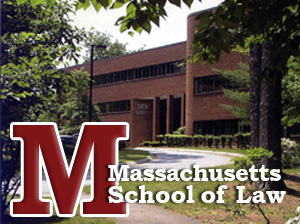"Surveillance Society" Poses Threat To Privacy and Individual Liberties
 Sherwood Ross - Sherwood Ross Associates Sherwood Ross - Sherwood Ross Associates


| Massachusetts School of Law at Andover
500 Federal Street
Andover, Massachusetts 01810 |  |
New surveillance technologies increasingly threaten Americans' civil liberties yet the public seems not to mind the ominous signs of an emerging police state, a law school professor warns.
"If we acquiesce in technology's wonders being utilized to track our every movement, every action, every purchase, every message - because there is benefit to us, as there is, in each of these - who is to blame when the state goes knocking on the neighbor's door?" asks Larry Starkey, an adjunct professor at the Massachusetts School of Law at Andover. "Who is to blame when the state comes knocking on our own doors?"

Technology, Starkey writes, "is giving the cops amazing reach." The individual is monitored by security video cameras covering the street and inside office buildings and stores; by credit cards that "record considerably more than mere debt obligations" and that list the place and times of all purchases; and by purchases made on "special member cards" that track "every item you buy, establishing a data base in your name, and drawing regular conclusions about your eating, partying, reading, junk-binging, and self-medicating habits." Also, Starkey says, "Your video store is doing the same. And so is your pay-per-view provider."
The law professor goes on to say, "Your emails, of course, are monitored, and, depending on their content, read by a government employee without a warrant to do so, thanks to federal computer programs with such sci-fi names as 'Echelon' and 'Carnivore.'" He notes that deleted emails "remain on your hard drive, your provider's hard drive, and the hard drives of the NSA(National Security Agency)." Even the medications you take are "stored in your medical files, your pharmacist's files and your insurance company's files."

"But this isn't science fiction," Starkey continues. "Your own computer keeps a lengthy record of which websites you have visited, including that merely curious half-minute or so you may have spent when the advertisement for 'Free Hot College Cutie Pix, Click Here,' popped up, unasked, on your computer's screen. Likely as not, the site also recorded your visit while inserting a 'cookie' on your hard drive so it would recognize you on your next visit."

Automatic toll booth stickers on car windshields provide a log for billing purposes but may also chart the distance traveled between two surveillance cameras and the driver's speed between them, making it possible "to produce a continual record of where a car has been, and at what times, and where it is right now, in real time," says Starkey.

"Technology, posing as a benefactor and nothing less, opens our lives to detailed past and present scrutiny far more effectively than thumb-screws ever did," he asserts. What's more, proposals are afoot over creating a DNA data base of all Americans and possibly "implanting small devices under the skin of pets and children…so they may be tracked electronically if petnapped or kidnapped," and in some places this is being done, Starkey writes. More surveillance and heightened police powers are a toxic mix, he says, and fly in the face of American tradition:

"We are the descendants of a tradition bent on distrusting government in whatever it initiates, and we are disinheriting ourselves with expectations that the rule of law will always properly separate equality from equity, will always value conscience as highly as pious obedience, and with wisdom and proletarian virtue as its strengths, will never advance the majority at the expense of the minority."

As for the nation's Founders who worked so assiduously to protect the new nation's civil liberties, Starkey writes, "Little did they know that pledging their lives, their fortunes and their sacred honor would, in only two centuries, beget a progeny of sheep who, rather than personally confronting one another's unappreciated personal behaviors, would willingly swap their privacy and their liberty to have government do it for them."
"Too few in this society seem to even consider that there is an ominous linkage between expanded police power and technology," the law school professor writes. "'My life's an open book,' too many smugly shrug, 'I've nothing to hide.' Which is nonsense, of course, if only because it is a statement accurate only to the current moment. None of us can guarantee we will not, someday, have something to hide. And that, of course, is the purpose of the Bill of Rights."

"If we cannot recognize the dangers of police power united with technology's intrusive capabilities, or do not care that they have mated, it must be that we expect of law some wisdom that will separate the liberties of the good person from those of the bad," Starkey writes, noting that that is a false assumption. Starkey made his observations in "The Long Term View," the magazine of the Massachusetts School of Law at Andover.

MSL is a 21-year-old law school whose pioneering mission is to inexpensively provide rigorous legal education, a pathway into the legal profession, and social mobility to members of the working class, minorities, people in midlife, and immigrants.

Through its television shows, videotaped conferences, an intellectual magazine, and internet postings, MSL - uniquely for a law school - also seeks to provide the public with information about crucial legal and non legal subjects facing the country.

Further information: Sherwood Ross, media consultant to MSL, Suite 403, 102 SW 6th Avenue , Miami , FL 33130 . sherwoodross10(at)gmail.com 305-205-8281 |



